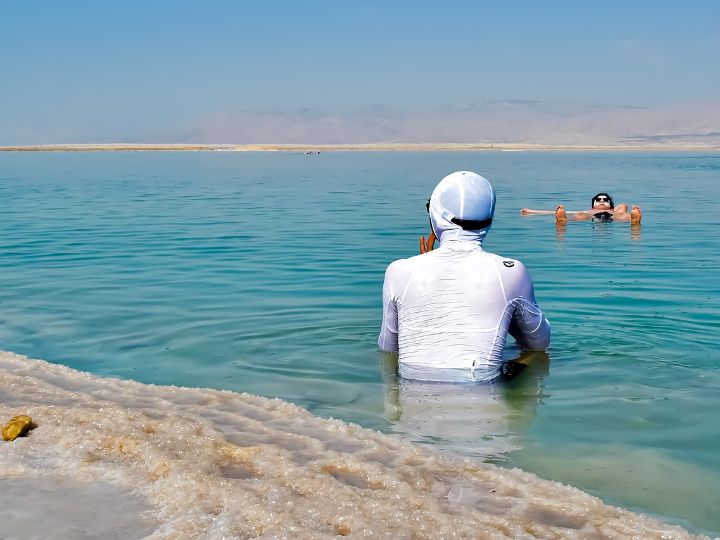The Dead Sea is a unique body of water located between Jordan, Israel, and Palestine in the Middle East. It has an extremely high salt concentration, which makes the water very buoyant. This high salt content makes it nearly impossible to sink or drown.
This high salinity has several interesting implications for anyone wondering about the possibility of drowning in the Dead Sea.
Understanding Salinity and Buoyancy
Salinity refers to the concentration of dissolved salts in water. In the case of the Dead Sea, its salinity is exceptionally high, around 34.2%, which is about 10 times saltier than the average ocean water. This extreme salinity affects the buoyancy of objects and people in the water.
Buoyancy is the upward force exerted by a fluid that opposes the weight of an immersed object. In simpler terms, it determines whether something sinks or floats in water. The higher the salinity of the water, the greater the buoyant force. This means that objects, including human bodies, are much more buoyant in the Dead Sea compared to regular seawater.
The Experience of Floating
When you enter the Dead Sea and lie on your back, you will naturally float on the surface due to the buoyancy provided by the high salt concentration. Buoyancy is the upward force exerted by a fluid on an object submerged or floating in it. The buoyant force on an object immersed in a fluid is equal to the weight of the fluid displaced by the object.
When an object is less dense than the fluid it is placed in, it will float because the upward buoyant force is greater than the downward force of gravity. For example, a wooden block floats in water because it is less dense than water, and the buoyant force is greater than its weight.
On the other hand, if an object is denser than the fluid, it will sink because the downward force of gravity is greater than the upward buoyant force. A rock sinks in water because it is denser than water, and the weight of the rock is greater than the buoyant force.
When you enter the Dead Sea, the high salt concentration makes the water denser than your body, resulting in a significant increase in buoyant force. This buoyant force pushes your body upward, making it nearly impossible to sink or drown. In fact, you will naturally float on the surface without any effort, with your body partially or entirely exposed above the water.
Safety Precautions
While drowning in the Dead Sea is highly unlikely, it's essential to take precautions to ensure a safe and enjoyable experience:
- Supervision: Always swim with a companion or where lifeguards are present, especially if you are not a strong swimmer.
- Avoid Ingestion: Be mindful not to swallow or allow water into your mouth or eyes. Rinse off thoroughly after exiting the water to remove salt residue.
- Respect Natural Hazards: Despite its unique properties, the Dead Sea can still pose risks, such as sun exposure and heat exhaustion. Stay hydrated and use sunscreen when visiting.
Conclusion
In conclusion, while the Dead Sea's high salinity makes drowning highly improbable, it's crucial to approach any body of water with caution and respect. Understanding the unique buoyancy of the Dead Sea enhances the experience of floating effortlessly and safely. By following basic safety guidelines, visitors can enjoy the remarkable natural wonder of the Dead Sea while minimizing any potential risks.
Remember, while the Dead Sea offers a one-of-a-kind experience, it's important to balance curiosity with awareness of personal safety to fully appreciate its wonders.

